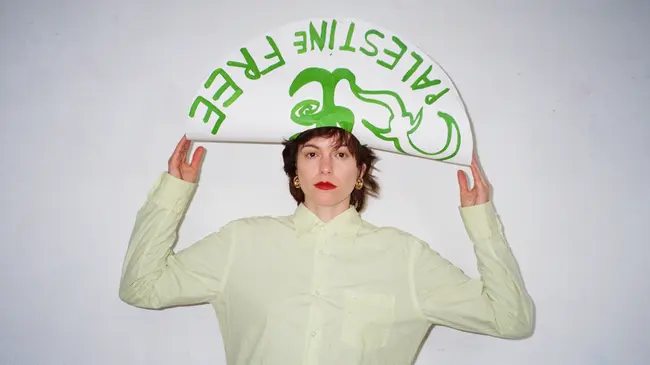I strongly believe in the power of improvisation in all its forms

Bert Cools is one of those musicians you’d never want to miss a concert from. He mainly plays the guitar and is active in multiple projects. You have Hoera, the electronic trio with his brother Stijn Cools and bassist Dries Laheye from Stuff. Or Merope, a project more on the folk-acoustic side, reinterpreting traditional Lithuanian songs. Also, Book of Air, plays stretched-out ambient with a full ‘jazz’ orchestra. A constant in his work is creating aural spaces to escape and dream in, according to him. His music is genuinely heartwarming and comforting, but it never grows stale as it keeps surprising you. At the 4th Stream Festival, he will be playing a solo concert, drawing a lot of inspiration from electronic music. It is the result of years of trying to figure out how to play music like Aphex Twin or Squarepusher on his guitar. We had the chance to talk to him.
I have already seen you perform quite often and I’ve always wondered if everything you play on stage is improvised.
My music always comes from a place of improvisation. Before a concert, I have some rough ideas of what worked really well the last few times or of what synths sound good with certain samples, but the music itself is all improvised. I don’t rehearse certain passages; I strongly believe in the power of improvisation in all its forms. There just is a certain something about being in the now, playing something and really meaning it, which I really like. Everything we do in our daily lives is also improvisation when you think about it, so you could say that maintaining this on stage is the most logical thing to do.
You use a lot of pedals and synths on stage. Does the gear you use dictate the music you play, or would you say the music you play dictates what gear you use?
That’s a good question. I think it’s both. I do make some conscious choices about the gear I use: I don’t use a laptop on stage or I slightly change my setup every concert. If I feel like going a bit harder, I might bring some fuzz or distortion pedals for instance. But I don’t think I need all my gear to play what I want. I once played a concert in Paris, opening for another band. An hour before I had to go on stage, I suddenly realized that I had forgotten all my pedals at home. I was freaking out because I thought I really needed them to play. I played the concert nonetheless and I was actually surprised by how little it mattered. Pedals and instruments are the only just tools to help you play the music that you want to at the end of the day. As musicians, we tend to forget that they are only just that.


You often work together with your brother Stijn. How did this relationship affect the music you play?
The influence of my brother Stijn and of my other brother Steven is big. I am the youngest brother, so I got in contact with the music my brothers were listening to at a very early age. In the beginning, this was rock and metal, but quite quickly it shifted to electronic stuff. Stijn and I enrolled at the conservatory at the same time and started playing in bands together; it all came naturally. At the conservatory, I also met Indrė Jurgelevičiūtė, who came to be a big influence on my music as well. After a while, we wanted to release the music we were making but we didn’t really find a label that fits with what we were doing. So we just decided to make our own label, Granvat, our playground to do stuff and release music. It has been growing ever since.
You had a formal jazz education. Would you say that this broad concept of improvisation is the most important thing you’ve learned there?
Yes, I think it is. My jazz education gave me a lot of tools to really play the music that I want to at the moment, to improvise in other words. You also meet all these interesting musicians and learn to play with a lot of people from different musical backgrounds. In playing with other people, you kind of gets presented with a mirror of yourself and your take on music. I started thinking about a lot of things: What can I do to make the band sound as good as possible, how do other people approach music, how can I tell my story in this group context?
In playing with other people, you kind of gets presented with a mirror of yourself and your take on music.
Next to electronic music, you also pull a lot of inspiration from folk music, more specifically the Lithuanian folk tradition.
Yes, that’s true. We reinterpret a lot of Lithuanian folk songs with Merope and we’ve also worked with a Lithuanian choir with Hoera., sampling recordings we made with them. The Lithuanian influence is all thanks to Indrė, who also plays in Merope. The old songs often go about the friction and harmony between man and nature, about dreams, and animals. A recurring theme is also the story of a human changing into an animal and vice versa. I really like those stories.
Different Class works with the interest of their community at heart.
Our work’s purpose is to foster a solid network for independent artists, those who love them, and those who want to support them. Become a member to contribute to the local Belgian art scene.




